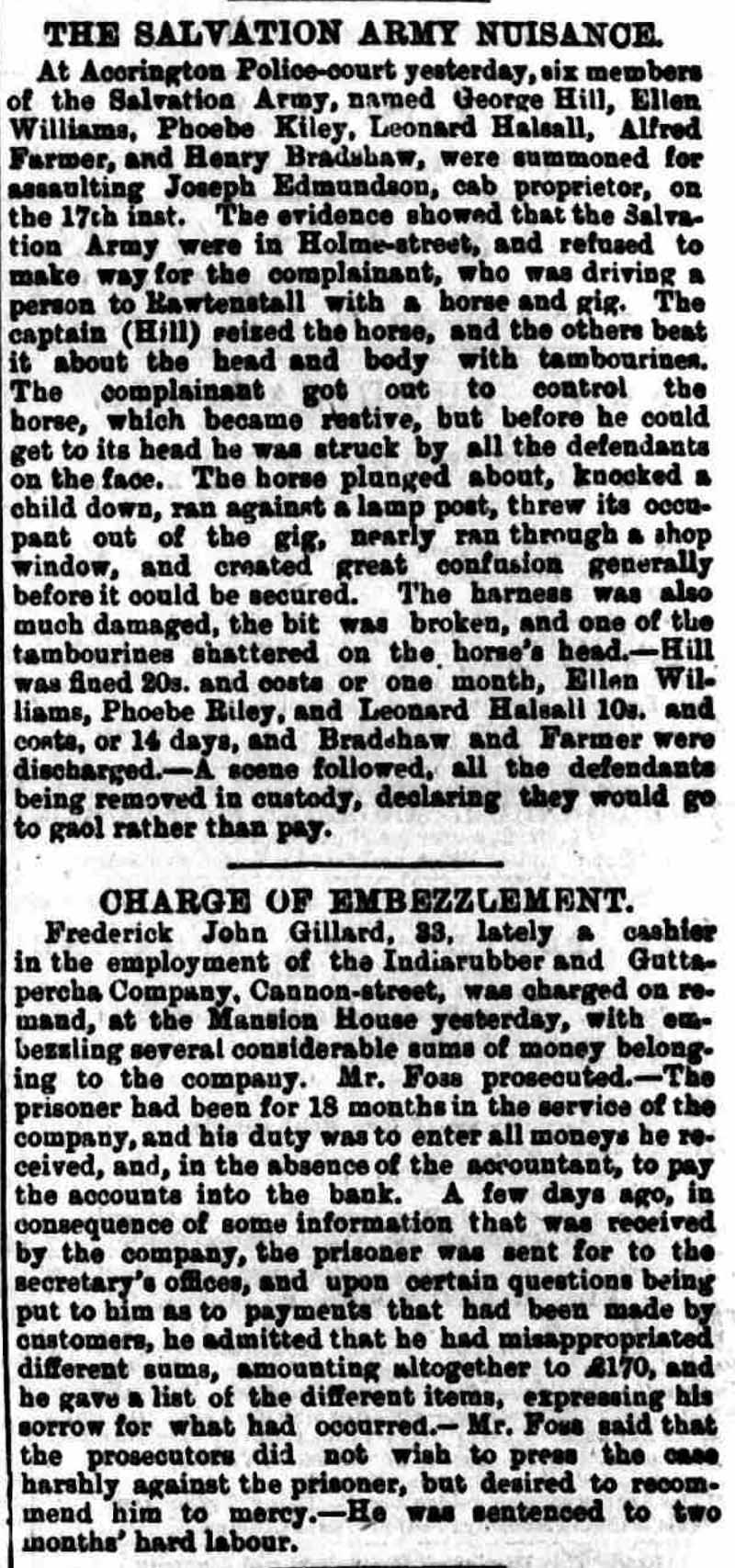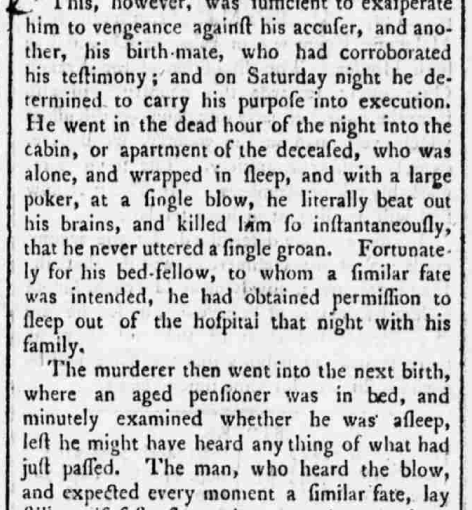Globe – Thursday 27 September 1883 front
The Salvation Army Nuisance

At Accrington Police-court yesterday, six members of the Salvation Army, named George Hill, Ellen Williams, Phoebe Kiley, Leonard Halsall, Alfred Farmer, and Henry Bradshaw, were summoned for assaulting Joseph Edmundson, cab proprietor, on the 17th inst.
The evidence showed that the Salvation Army were in Holme-street, and refused to make way for the complainant, who was driving a person to Rawtenstall with a horse and gig. The captain (Hill) seized the horse, and the others beat it about the head and body with tambourines. The complainant got out to control the horse, which became restive, but before he could get to its head he was struck by all the defendants on the face. The horse plunged about, knocked a child down, ran against a lamp post, threw its occupant out of the gig, nearly ran through a shop window, and created great confusion generally before it could be secured.
The harness was also much damaged, the bit was broken, and one of the tambourines shattered on the horse’s head. — Hill was fined 20s. and costs or one month, Ellen Williams, Phoebe Riley, and Leonard Halsall 10s. and costs, or 14 days, and Bradshaw and Farmer were discharged. — A scene followed, all the defendants being removed in custody, declaring they would go to gaol rather than pay.
Charge of Embezzlement
Frederick John Gillard, 33, lately a cashier in the employment of the India Rubber and Gutta-percha Company, Cannon-street, was charged on remand, at the Mansion House yesterday, with embezzling several considerable sums of money belonging to the company. Mr. Foss prosecuted.
The prisoner had been for 18 months in the service of the company, and his duty was to enter all moneys he received, and, in the absence of the accountant, to pay the accounts into the bank. A few days ago, in consequence of some information that was received by the company, the prisoner was sent for to the secretary’s offices, and upon certain questions being put to him as to payments that had been made by customers, he admitted that he had misappropriated different sums, amounting altogether to £170, and he gave a list of the different items, expressing his sorrow for what had occurred.
Mr. Foss said that the prosecutors did not wish to press the case harshly against the prisoner, but desired to recommend him to mercy. — He was sentenced to two months’ hard labour.
ANALYSIS AND EXPLANATION
The Salvation Army Nuisance
- Legal Context:
- The Salvation Army was a relatively new movement at the time, and its members were often seen as disruptive due to their public marches, use of instruments, and vocal protests.
- The defendants faced charges of assault and causing public disorder.
- The fine system or imprisonment (as alternatives) reflects how justice operated for misdemeanours during the Victorian era.
- Incident Analysis:
- The physical assault on the horse and the complainant by using tambourines signifies a symbolic yet violent protest against the complainant’s actions.
- Damage to property (harness and gig), endangering public safety (injured child and chaos caused), and personal harm (assault on Edmundson) were key aspects of the charge.
- Outcome:
- The penalties were modest, but the refusal of the accused to pay fines and opt for imprisonment suggests defiance or lack of resources.
- Social movements like the Salvation Army often rejected the legal authority as part of their ideological stance.
Charge of Embezzlement
- Legal Context:
- Embezzlement was a serious offense, especially in an era where financial integrity was paramount in a growing industrial economy.
- £170 (equivalent to thousands of pounds today) was a significant amount, but the accused’s remorse and cooperation led to a lenient sentence.
- Incident Analysis:
- Gillard’s role required high trust, managing cash flows in the absence of his superior.
- His admission and cooperation likely mitigated the punishment, showcasing the court’s discretion in sentencing based on character and circumstances.
- Outcome:
- The sentence of two months’ hard labour, though short, was physically demanding and a common punishment for financial crimes in Victorian England.
- The prosecution’s recommendation for mercy highlights the social expectation of fairness over harsh punishment.
CONTEXTUAL LEGAL NOTES
- Victorian Justice System:
- Justice was swift and often publicly executed (in courtrooms or local newspapers).
- Imprisonment terms were relatively short for financial crimes compared to today but physically gruelling due to labour requirements.
- Fines were a popular option, especially for petty offenses, reflecting the class-based nature of punishments.
- Social Dynamics:
- Movements like the Salvation Army faced friction with authorities due to their non-conformist approach.
- Employers sought legal recourse for embezzlement, underscoring the importance of accountability in an industrial economy.
CONTEXTUAL LEGAL NOTES
- Victorian Justice System:
- Justice was swift and often publicly executed (in courtrooms or local newspapers).
- Imprisonment terms were relatively short for financial crimes compared to today but physically gruelling due to labour requirements.
- Fines were a popular option, especially for petty offenses, reflecting the class-based nature of punishments.
- Social Dynamics:
- Movements like the Salvation Army faced friction with authorities due to their non-conformist approach.
- Employers sought legal recourse for embezzlement, underscoring the importance of accountability in an industrial economy.
The Globe
Victorian Justice and Social Dynamics: The Salvation Army Nuisance and an Embezzlement Case in 1883. #VictorianJustice #SocialHistory #LegalHistory #SalvationArmy #Embezzlement #VictorianEra #HistoricalResearch #BritishHistory #19thCenturyCrime #PublicOrder #IndustrialRevolution #HistoryMatters





